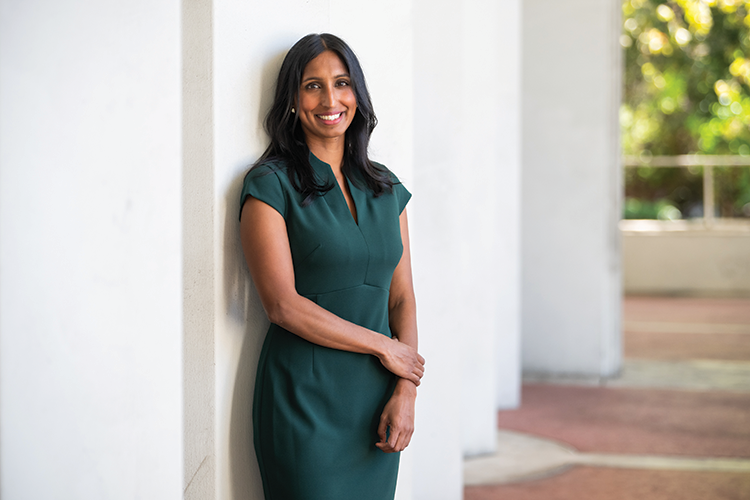
(Photo by Barbara Kinney)
In early 2015, Swapna Reddy volunteered for a week at the South Texas Family Residential Center, an immigration detention center near the U.S.-Mexico border that held thousands of asylum-seeking parents and their children.
That’s where Reddy met Suny Rodriguez Alvarado and her 7-year-old son, who had been at the center for four months after fleeing violence and persecution in Honduras. Reddy and three of her classmates—Conchita Cruz, Dorothy Tegeler and Liz Willis, who were members of Yale Law School’s Worker & Immigrant Rights Advocacy Clinic—later represented them in their immigration cases.
They not only helped Rodriguez and her son win her cases, but at her urging, they also founded the Asylum Seeker Advocacy Project in May 2015 to assist other families facing wrongful detention and deportation.
“Regardless of how you feel about asylum-seekers, I think it’s hard to take issue with the idea that asylum-seekers deserve to know what the laws are and deserve to know how to follow them,” says Reddy, 38, whose parents emigrated from India and raised her and her brothers outside of Nashville, Tennessee.
In 2016, shortly before graduating from law school, Reddy and her co-founders took the project to the New York City-based Urban Justice Center. They employed what was then a unique model—rapid-response remote legal aid. They also built a private online community to connect asylum-seekers who would otherwise be geographically isolated.
“It’s hard to remember, but before the pandemic, the idea of remote work was pretty uncommon, and there was a lot of skepticism that it could be done effectively,” says Michael Wishnie, who co-directs Yale’s Worker & Immigrant Rights Advocacy Clinic and now serves on the Asylum Seeker Advocacy Project’s board. “And yet they perceived that for new asylum-seekers who were settling in rural Georgia or Tennessee or Utah, there just wasn’t an option to provide on-the-ground legal services.”
The project provides its members—now more than 680,000 asylum-seekers from 175 countries—with access to a virtual legal help desk, news alerts and other critical resources as they navigate the immigration system. The Asylum Seeker Advocacy Project no longer offers direct representation; instead, it gives asylum-seekers the tools and know-how to take control of their own cases, says Reddy, who serves as the organization’s co-executive director alongside Cruz.
The Asylum Seeker Advocacy Project, which has a remote team of more than 20 lawyers, technologists and other experts, also asks its members to help set its priorities and advocate to improve the immigration system. Reddy says a top concern for members now is lengthy delays for work permits and asylum interviews.
Among its collective wins, the Asylum Seeker Advocacy Project and its members last year successfully advocated for new regulations that will allow immigrants facing delays in work permit renewals to get a year and a half of additional employment authorization.
“An awesome thing about Swapna is she’s a Renaissance woman,” says Becca Heller, the co-founder of the International Refugee Assistance Project, who has known Reddy since law school. “She is a brilliant lawyer but also brilliant at technology. She’s been able to bring a lot of that to ASAP and think about how do tech and data and movement-building all intersect in this space, and how do you leverage that to something bigger?”

Joan Howarth and Deborah Jones Merritt
Oregon State Board of Bar Examiners